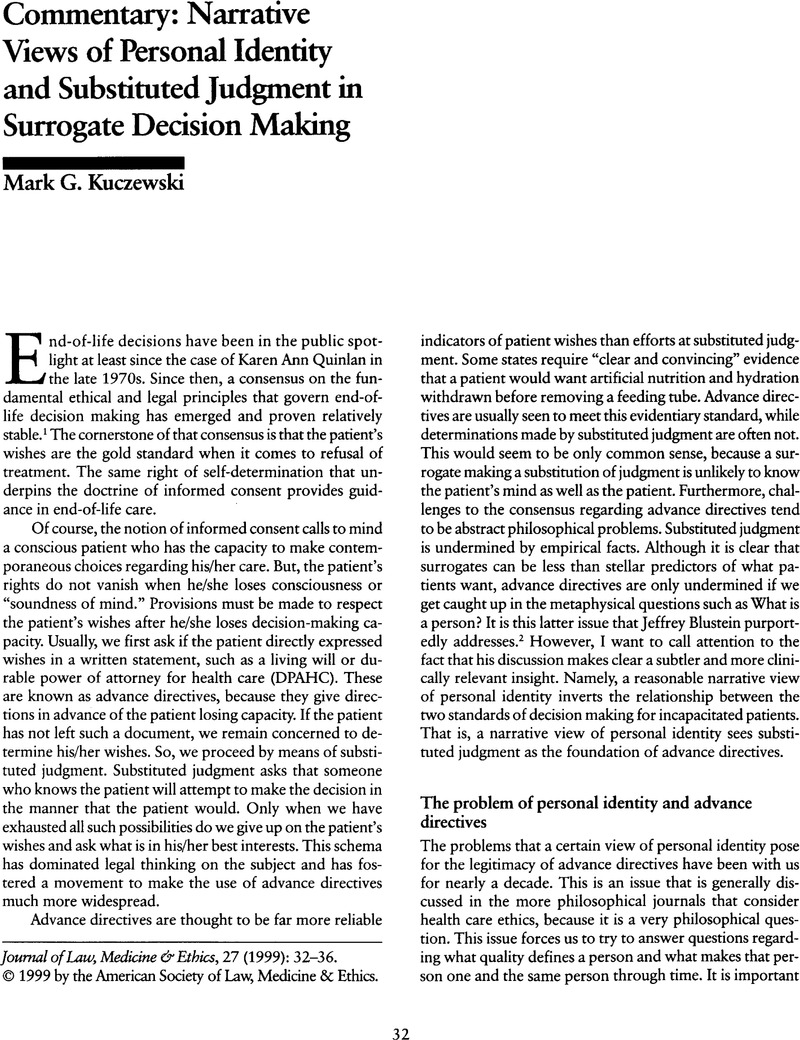Crossref Citations
This article has been cited by the following publications. This list is generated based on data provided by Crossref.
Koch, Tom
2001.
Future states: the axioms underlying prospective, future-oriented, health planning instruments.
Social Science & Medicine,
Vol. 52,
Issue. 3,
p.
453.
Moore, Crystal Dea
Sparr, Jennifer
Sherman, Susan
and
Avery, Lisa
2003.
Surrogate Decision-Making.
Social Work in Health Care,
Vol. 37,
Issue. 2,
p.
1.
Tan, Jacinta O.A.
Hope, Tony
and
Stewart, Anne
2003.
Anorexia nervosa and personal identity: The accounts of patients and their parents.
International Journal of Law and Psychiatry,
Vol. 26,
Issue. 5,
p.
533.
Cohen, Cynthia B.
2004.
Handbook of Bioethics.
p.
291.
Fins, Joseph J.
Maltby, Barbara S.
Friedmann, Erika
Greene, Michele G.
Norris, Kaye
Adelman, Ronald
and
Byock, Ira
2005.
Contracts, covenants and advance care planning: an empirical study of the moral obligations of patient and proxy.
Journal of Pain and Symptom Management,
Vol. 29,
Issue. 1,
p.
55.
Hirschman, Karen B.
Kapo, Jennifer M.
and
Karlawish, Jason H.T.
2006.
Why Doesn't a Family Member of a Person With Advanced Dementia Use a Substituted Judgment When Making a Decision for That Person?.
The American Journal of Geriatric Psychiatry,
Vol. 14,
Issue. 8,
p.
659.
Broström, Linus
Johansson, Mats
and
Nielsen, Morten Klemme
2007.
“What the patient would have decided”: A fundamental problem with the substituted judgment standard.
Medicine, Health Care and Philosophy,
Vol. 10,
Issue. 3,
p.
265.
Torke, Alexia M.
Alexander, G. Caleb
and
Lantos, John
2008.
Substituted Judgment: The Limitations of Autonomy in Surrogate Decision Making.
Journal of General Internal Medicine,
Vol. 23,
Issue. 9,
p.
1514.
Egonsson, Dan
2010.
Some comments on the substituted judgement standard.
Medicine, Health Care and Philosophy,
Vol. 13,
Issue. 1,
p.
33.
Tunzi, Marc
2012.
A New Standard for Incapacitated Patient Decision Making: The Clinical Standard of Surrogate Empowerment.
The Journal of Clinical Ethics,
Vol. 23,
Issue. 4,
p.
316.
Feltz, Adam
and
Samayoa, Stephanie
2012.
Heuristics and Life-Sustaining Treatments.
Journal of Bioethical Inquiry,
Vol. 9,
Issue. 4,
p.
443.
Johnston, Carolyn
2013.
The weight attributed to patient values in determining best interests.
Journal of Medical Ethics,
Vol. 39,
Issue. 9,
p.
562.
Johnston, Carolyn
2014.
Advance decision making – rhetoric or reality?.
Legal Studies,
Vol. 34,
Issue. 3,
p.
497.
Stonestreet, E. L.
2014.
Love as a Regulative Ideal in Surrogate Decision Making.
Journal of Medicine and Philosophy,
Vol. 39,
Issue. 5,
p.
523.
Lossignol, Dominique
2014.
Narrative ethics in the field of oncology.
Current Opinion in Oncology,
Vol. 26,
Issue. 4,
p.
385.
Phillips, John
and
Wendler, David
2015.
Clarifying substituted judgement: the endorsed life approach: Table 1.
Journal of Medical Ethics,
Vol. 41,
Issue. 9,
p.
723.
Johnston, Carolyn
Banner, Natalie
and
Fenwick, Angela
2016.
Patient narrative: an ‘on-switch’ for evaluating best interests.
Journal of Social Welfare and Family Law,
Vol. 38,
Issue. 3,
p.
249.
White, Lucie
2017.
Personal Identity and Patient-Centered Medical Decision Making.
AJOB Neuroscience,
Vol. 8,
Issue. 3,
p.
194.
Sokolowski, Marcia
2018.
Dementia and the Advance Directive.
p.
45.
Hammami, Muhammad M.
Abuhdeeb, Kafa
Hammami, Muhammad B.
De Padua, Sophia J. S.
and
Al-Balkhi, Areej
2019.
Prediction of life-story narrative for end-of-life surrogate’s decision-making is inadequate: a Q-methodology study.
BMC Medical Ethics,
Vol. 20,
Issue. 1,





